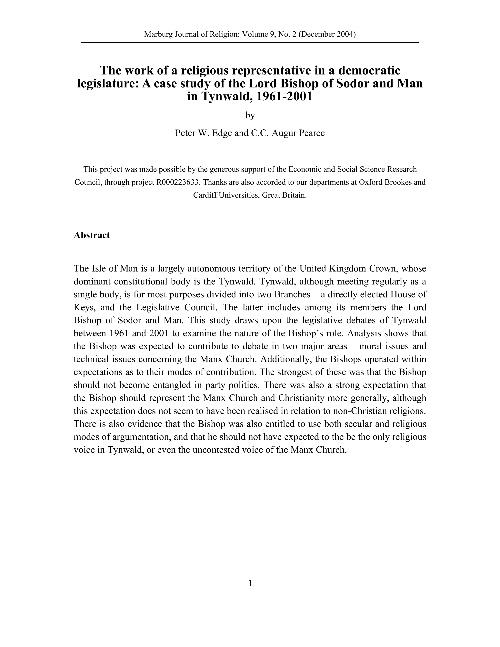The work of a religious representative in a democratic legislature: A case study of the Lord Bishop of Sodor and Man in Tynwald, 1961-2001
The Isle of Man is a largely autonomous territory of the United Kingdom Crown, whose dominant constitutional body is the Tynwald. Tynwald, although meeting regularly as a single body, is for most purposes divided into two Branches – a directly elected House of Keys, and the Legislative Council. The...
Gespeichert in:
| Veröffentlicht in: | Marburg Journal of Religion |
|---|---|
| Autoren: | , |
| Format: | Artikel (Zeitschrift) |
| Sprache: | Englisch |
| Veröffentlicht: |
Philipps-Universität Marburg
2004
|
| Online Zugang: | Online Zugang |
| Tags: |
Tag hinzufügen
Keine Tags, Fügen Sie den ersten Tag hinzu!
|
| Zusammenfassung: | The Isle of Man is a largely autonomous territory of the United Kingdom Crown, whose dominant constitutional body is the Tynwald. Tynwald, although meeting regularly as a single body, is for most purposes divided into two Branches – a directly elected House of Keys, and the Legislative Council. The latter includes among its members the Lord Bishop of Sodor and Man. This study draws upon the legislative debates of Tynwald between 1961 and 2001 to examine the nature of the Bishop’s role. Analysis shows that the Bishop was expected to contribute to debate in two major areas – moral issues and technical issues concerning the Manx Church. Additionally, the Bishops operated within expectations as to their modes of contribution. The strongest of these was that the Bishop should not become entangled in party politics. There was also a strong expectation that the Bishop should represent the Manx Church and Christianity more generally, although this expectation does not seem to have been realised in relation to non-Christian religions. There is also evidence that the Bishop was also entitled to use both secular and religious modes of argumentation, and that he should not have expected to the be the only religious voice in Tynwald, or even the uncontested voice of the Manx Church. |
|---|---|
| DOI: | 10.17192/mjr.2004.9.3716 |
 Publikationsserver
Publikationsserver